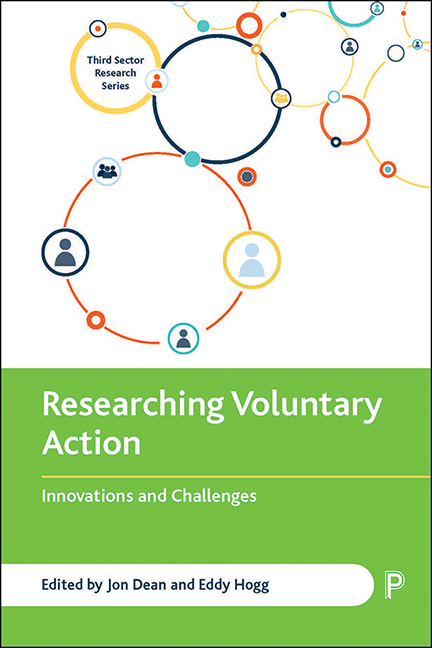Book contents
- Frontmatter
- Contents
- List of figures, tables and boxes
- Notes on contributors
- Acknowledgements
- Series editor’s foreword
- 1 Introduction
- 2 (Un)suitable methods and reflexive considerations: an interview and focus group study of youth volunteering
- 3 Interpretive ethnography: a UK charity shop case study
- 4 Collaborative philanthropy and doing practically relevant, critical research
- 5 Peer research: co-producing research within the context of voluntary and community action
- 6 Charity advertising: visual methods, images and elicitation
- 7 Using archives and objects in voluntary action research
- 8 Using Mass Observation as a source of qualitative secondary data for interdisciplinary longitudinal research on voluntary action
- 9 Investigating meanings and messages on volunteering through television media
- 10 Annual reporting in voluntary organisations: opportunities for content analysis research
- 11 Researching risk in the voluntary sector: the challenges and opportunities of regulatory data
- 12 Exploring the benefits of volunteering: combining survey and administrative data in the Nordic ‘laboratory’
- 13 Spatial approaches to the voluntary sector
- 14 Restudies, surveys and what counts as volunteering
- 15 Conclusion
- References
- Index
11 - Researching risk in the voluntary sector: the challenges and opportunities of regulatory data
Published online by Cambridge University Press: 15 September 2022
- Frontmatter
- Contents
- List of figures, tables and boxes
- Notes on contributors
- Acknowledgements
- Series editor’s foreword
- 1 Introduction
- 2 (Un)suitable methods and reflexive considerations: an interview and focus group study of youth volunteering
- 3 Interpretive ethnography: a UK charity shop case study
- 4 Collaborative philanthropy and doing practically relevant, critical research
- 5 Peer research: co-producing research within the context of voluntary and community action
- 6 Charity advertising: visual methods, images and elicitation
- 7 Using archives and objects in voluntary action research
- 8 Using Mass Observation as a source of qualitative secondary data for interdisciplinary longitudinal research on voluntary action
- 9 Investigating meanings and messages on volunteering through television media
- 10 Annual reporting in voluntary organisations: opportunities for content analysis research
- 11 Researching risk in the voluntary sector: the challenges and opportunities of regulatory data
- 12 Exploring the benefits of volunteering: combining survey and administrative data in the Nordic ‘laboratory’
- 13 Spatial approaches to the voluntary sector
- 14 Restudies, surveys and what counts as volunteering
- 15 Conclusion
- References
- Index
Summary
Introduction
The behaviour of voluntary organisations, and their willingness to be accountable, is a pressing policy issue around the world. In the UK, for example, legitimacy and public trust are under threat, due to a recent spate of high-profile voluntary sector crises and scandals, including concerns about large-scale and pervasive instances of financial mismanagement, intrusive and potentially harmful fundraising practices and the abuse of vulnerable beneficiaries. Concurrently, charity regulators are in a state of flux, dealing with declining or stagnating budgets and grappling with new strategic priorities to become data-led organisations. Understanding the nature, extent and impact of risk is therefore of considerable importance for the field, sector, public and policy practitioners.
This chapter reflects on the methodological implications and challenges associated with using regulatory data to study risk in the voluntary sector. In particular we describe collecting, operationalising and analysing the large-scale, often complex, administrative data held by regulators that are necessary to study this topic. Drawing on numerous examples from a multi-year programme of research on the UK charity sector, we outline both the promise and the perils for researchers embarking on their own research.
The challenges and opportunities of regulatory data in measuring risk
The nature of risk in the voluntary sector is broad, and derived from the panoply of operational areas and decisions inherent in running organisations: ‘Financial, personnel, programme and capital expenditure decisions all entail risk because they involve interactions with changing, complex, volatile or intrinsically stochastic economic, political and social environments’ (Young, 2009: 33). In some areas our understanding of risk is good, and backed by strong empirical evidence, in particular organisational failure (Helmig et al, 2014) and financial vulnerability (see Dayson, 2013). There are some areas where there is a burgeoning set of empirical work being conducted, like organisational fraud (Archambeault et al, 2015) and non-financial disclosures. But there remain topics that are under-theorised or lacking in robust or plentiful empirical examination, such as mission completion (Helmig et al, 2014), ethical fundraising practice and safeguarding of vulnerable beneficiaries. What unifies many attempts at examining risk is the use of data held by bodies with responsibility for overseeing voluntary organisations, in particular the various charity regulators.
- Type
- Chapter
- Information
- Researching Voluntary ActionInnovations and Challenges, pp. 122 - 134Publisher: Bristol University PressPrint publication year: 2022



